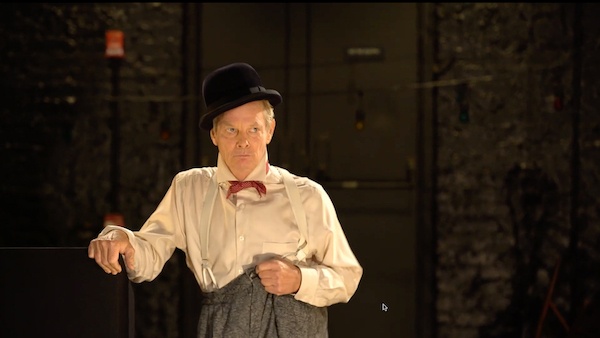Theater Review: “On Beckett / In Screen” — Bill Irwin Honors Samuel Beckett
By Steve Feeney
Bill Irwin’s homage to Samuel Beckett explores what makes the writer so fascinating, even inspiring, for those who appreciate the knockabout beauty of his despair.
On Beckett / In Screen. An Exploration of the Works of Samuel Beckett, conceived and performed by Bill Irwin. Directed for camera by M. Florian Staab and Irwin. Presented by the Irish Repertory Theatre, through November 22.

Bill Irwin in a scene from On Beckett / In Screen. Photo: Irish Repertory Theatre.
In this strange year, the Irish Repertory Theatre (IRT) has provided welcome relief to those looking for high-quality theater in a shutdown world. Their excellent online productions of Conor McPherson’s The Weir and Eugene O’Neill’s A Touch of the Poet certainly made it easier for me to get through the past few months.
Now, while we’re all still wobbling in some sort of existential holding pattern — vaccines to the rescue? — the time is right to (re)visit the desperate comic artistry of Samuel Beckett, an absurdist writer who knew a lot about what it takes to wait … and wait. His was a vision of bleak and anxious solitude that could be both frightening and funny.
One of the best of the writer’s recent interpreters is in the house (via a computer screen) for the latest IRT production.
The award-winning actor/comedian/clown Bill Irwin has performed in several major productions of Beckett over the years, including stints as the characters Lucky and Vladimir in Waiting for Godot. An aficionado of silent film comedy as well, Irwin has shown an expert affinity for the Nobel Prize–winner’s dour poetic effusions. He notes during the evening that he has sometimes found the work frustratingly uneven, but he has always returned for another deep dive into Beckett’s view of the void.
Irwin’s On Beckett / In Screen, which he wrote, co-directed (with M. Florian Stabb) and stars in, explores what makes Beckett so fascinating, even inspiring, for those who appreciate the knockabout beauty of his despair. This new play, based on Irwin’s lauded 2018 in-person production, feels personal; it takes us close to the place where the performer and Beckett’s view of life touch, perhaps even fuse.
On a bare stage at the small, and quite empty, IRT theater in New York, Irwin makes superb use of his flexible facial features, skill at quick vocal modulation, and flexible body to focus on what he has deemed to be some of the elemental “strands” in Beckett’s complex dramas. He focuses on the ’50s masterpieces, reciting or acting passages from, as well as commenting on, such works as Texts for Nothing, The Unnamable, and Waiting for Godot (including a funny bit about how that last name is to be pronounced).
Irwin picks characters who fret their enigmatic nature and purpose in a mysterious universe that demands that they summon the “strength to be able to begin,” as the performer puts it. His style — relaxed yet disciplined — reminded me of the actor Jack Lemmon, another chameleon who could change expressions and attitudes instantaneously.
Irwin thinks Beckett’s “Irish voice” comes through in his writings, even though they were written in French, and that the author’s taste for vaudeville and silent film comedies grounds his work in what might otherwise fall into a too lofty modernist vein.
Irwin warns actors against holding onto “favorite lines,” though he shares a few of his. He stresses the need to “serve the play” and the importance, particularly with Beckett, of following stage directions and presenting the right physical “silhouette.” He brings out the bowler hats and baggy pants to illustrate this latter point, as well as to provide a delightful glimpse of his own Ringling Brothers–trained skills as a physical and verbal clown.
Meditating on the texts, Irwin argues that, despite the critical caricatures, Beckett’s words are not all about registering a cosmic chuckle at the absurdity of it all. They can evoke the damage done by violence, as in a passage the actor reads from the early novel Watt, which suggests how “bleakness” is connected with “the way people treat each other.” The actor adds, via a brief reference to the current pandemic, that he doesn’t enjoy despair. Instead, he finds it “thrilling to go against it.”
What is the thrill here? Irwin celebrates the gaunt power of Beckett’s words (with their “slippery pronouns”) and his tragicomic world to defy the chill of an empty stage — and go on.
Steve Feeney is a Maine native and attended schools in Maine, New Hampshire, and Massachusetts. He has a Master of Arts Degree in American and New England Studies from the University of Southern Maine. He began reviewing music on a freelance basis for the Portland Press Herald/Maine Sunday Telegram in 1995. He was later asked to also review theater and dance. Recently, he has added BroadwayWorld.com as an outlet and is pleased to now contribute to Arts Fuse.

